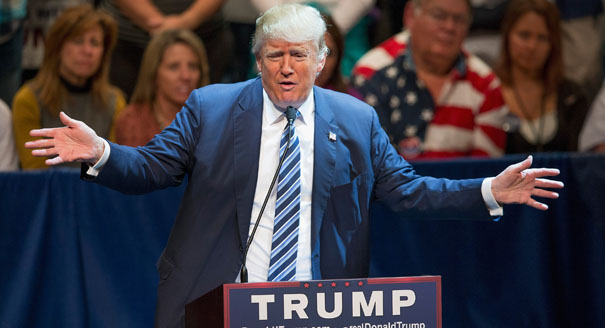David Rothkopf
{
"authors": [
"David Rothkopf"
],
"type": "legacyinthemedia",
"centerAffiliationAll": "",
"centers": [
"Carnegie Endowment for International Peace"
],
"collections": [],
"englishNewsletterAll": "",
"nonEnglishNewsletterAll": "",
"primaryCenter": "Carnegie Endowment for International Peace",
"programAffiliation": "",
"programs": [],
"projects": [],
"regions": [],
"topics": []
}
Source: Getty
The Soul-Sucking, Attention-Eating Black Hole of the Trump Presidency
America endlessly watches for the latest Trump blunder or scandal, but will the President inadvertently or otherwise damage the fundamentals of what makes America great?
Source: Foreign Policy
America is a naturally narcissistic nation. From “exceptionalism” to being the “last best hope of Earth,” we are raised to believe that life on this planet revolves around those of us who live somewhere here in “God’s country.” But even with a history of believing that we are the sun around which all other countries orbit, it has fallen to our nation’s narcissist-in-chief to take us to a level of self-obsession that makes Kanye West look like Thomas Merton.
It is not just that Donald Trump is an egomaniac. Most presidents have a pathological need for approval and attention. It’s why they suffer the slings and arrows that come with seeking the country’s top office. Egomania is for Hollywood actors and House committee chairmen who think the rule of law doesn’t apply to them. Trump is a Transcendental Solipsist. It is not just that he has a strong sense of self. His view of the universe does not extend a single inch beyond the boundaries of his own interests. That is why normative concepts like truth or commonly held values or the national interest are completely alien to him. There is Trump world, and then there is oblivion.
Of course, the fact that our president is so psychologically broken would not automatically mean that the rest of us would become infected with a new, Trumpian me-me-me-ism. No, perhaps the sole notable achievement of his record-breakingly bad first couple of months in office has been his ability to make his pathology our pathology, by invoking the multiplicative principle of narcissism. If you take a nation of narcissists and place the ur-narcissist at their center of attention and he behaves in a way that makes it impossible for them to look away then all of a sudden we become like him, the world falls away, the universe evaporates, and we enter whatever is the opposite of the Buddhist ideal of enlightenment. Unlightenment? This is Transcendental Solipsism. It’s all about us being all about him being all about himself.
This is bad. As I write this, I am in Shenzhen, China — a city that barely existed when Donald Trump began his fabled, checkered career as a real-estate developer. While he was producing garish properties and casino failures, this city grew to be 50 percent larger than New York. It is one of the richest cities in China, a thriving economic hub that is part of the Pearl River Delta megalopolis that is home to Hong Kong, Macao, and 60 million people who all seem so attentive to their booming businesses that they barely can spare a thought for Trump. And, as Trump sucks America into his ego’s gravitational field, into the swirling black hole of his neediness and delusions of grandeur, our country, too, seems less relevant. As one Chinese business leader said to me recently, “You have become preoccupied. That is not necessarily a bad thing for us.”
The Chinese did not mind when we were preoccupied with the Middle East and willing to spend blood and treasure in that region; it enabled them to roll out their coherent regional strategy for influence and interdependence without much interference from us. And President Xi Jinping did not seem to mind too much at Davos this year when, sensing the onset of Trumpism (the isolationism that comes from not caring about anyone or anything other than yourself) he offered China as an alternative leader in the international system.
But there is another dimension to the Trump phenomenon that has Chinese observers uneasy. As the same business leader said to me, “We don’t mind it when you leave more room for us to grow. But you do play an important role in keeping the world safe. The world needs the United States. And right now when we look at threats in our region or the unpreparedness of your leaders (a reference to the recent not very well-received trip of America’s phantom Secretary of State Rex Tillerson) we are getting more and more worried.”
This is a far cry from the enthusiasm for Trump that I heard here in the fall. And it is a feeling that I have heard echoed by leaders from the Americas, Europe, the Middle East, and South Asia. People are concerned that something different and troubling is happening in America. That, of course, is because it is.
Trump may have thought he would mesmerize us with his glory and his “winning.” Instead what has happened is that America has become addicted to the 24-hour-a-day reality television show that is his not-so-slow-motion downfall. Every day, there are lies and gaffes and insults to allies and legislative blunders and awful policies made worse by horrible execution. And then, beyond that there are ethical lapses and an ever-growing hint of something very much like treason in the air. With the FBI acknowledging that they are investigating possible collusion between the Trump campaign and the Russian government to influence the outcome of last year’s election — and with senior congressional figures like Rep. Adam Schiff indicating that there is “more than circumstantial” evidence to support the idea of that collusion — it seems this last story is only likely to grow more irresistible in the months ahead.
Indeed, the more we know about the behavior of Trump cronies, family, and cabinet colleagues with respect to their ties to Moscow, the more it seems we are on the verge of a constitutional crisis that may be greater than any faced in the United States since the Civil War. It’s a political scandal that may make Watergate seem like small potatoes. And if you think the 24-hour news cycle is sucking away your time and attention today, just imagine what a media spectacle the decline and fall of this American embarrassment might be.
If you doubt that the impact of the shift to All Trump, All the Time News is making it hard to focus on much of what might otherwise be worthy of our attention consider this: Since taking office, the Trump administration has ramped up military operations in Yemen and Iraq; committed to deploying over 1,000 additional troops in Syria; stood by as civilian casualties have soared and watched as a strategically important province in Afghanistan fell to the Taliban — all without making so much as a ripple in the public consciousness of the United States. Trump was very nearly mute on North Korea (save for some ill-considered tweeting, of course).
He can’t seem to find the time to condemn the Russians for violence against voices of dissent or ramping up of activities in Ukraine. And we can’t seem to care. Europe faces major political tests by populist groups in France and Germany. The costs of climate change are getting higher. And China … well, China is quietly showing up for work every morning building an economy and a role in the world that is largely indifferent to Trump except when he blusters about trade wars (wars they know that the U.S. business community is unlikely to let him engage in for long).
In short, Trump is very likely a short-timer whose moment on our national stage — even if it lasts four years — will not have warranted the degree to which it has shifted our attention from the important long-term issues that do not go away simply because we stop paying attention to them or, as in the case of climate change or Russian wrongdoing, our president continues to pretend they don’t exist. Just as the greatest cost of the Iraq War and much of the war on terrorism has been their opportunity cost, the damage done by Trump sucking all the oxygen out of the room is likely to be the areas where the resulting oxygen deprivation is causing us to black out and not attend to the issues posing long-term threats to American leadership and security … or those presenting long-term opportunities.
Trump will not inadvertently or otherwise damage the fundamentals of what makes America great. Indeed, recent events have restored hope that perhaps his story may one day be seen as proof that the American system works and that bad actors are ultimately brought down. But we need to tear our eyes away from the spectacle of this clusterfuck of a presidency and its daily dramas and periodically look up and out to our horizons, recognizing that the narcissism aside, there remains real greatness in America that needs tending, planning, and nurturing in the context of the real world — even if, at the moment, there is very little evidence of that greatness at the center of our government.
About the Author

Former Visiting Scholar
David Rothkopf was a visiting scholar at the Carnegie Endowment as well as the former CEO and editor in chief of the FP Group.
- How Bush, Obama, and Trump Ended Pax AmericanaIn The Media
- A Bigger ClubhouseIn The Media
David Rothkopf
Recent Work
Carnegie does not take institutional positions on public policy issues; the views represented herein are those of the author(s) and do not necessarily reflect the views of Carnegie, its staff, or its trustees.